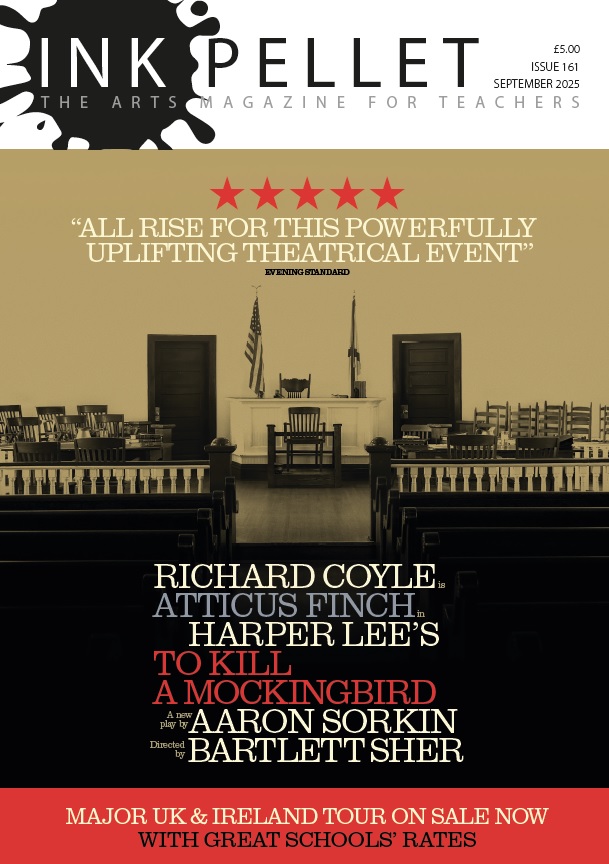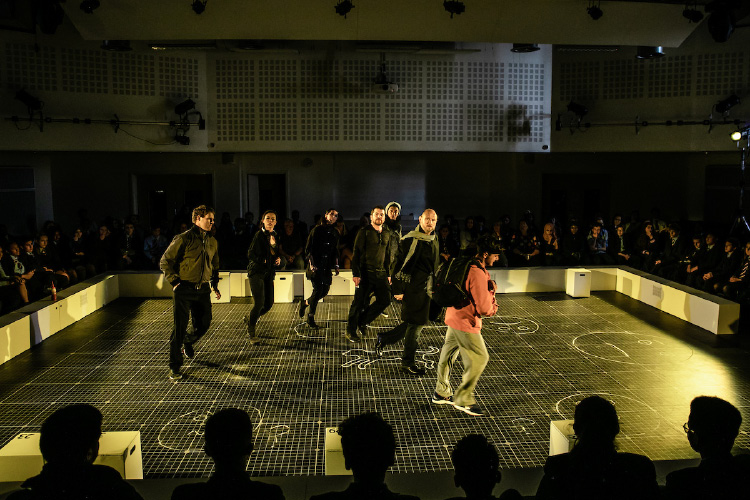Susan Elkin visited a school in north London to see the National Theatre’s abridged version of The Curious Incident, touring schools nationwide, aiming to bring high quality theatre into schools to enrich teaching and learning.
The Curious Incident of the Dog in the Night-Time is one of the National Theatre’s most successful shows of recent years. A fine, sensitive, entertaining study of high level autism (although the show never uses that label) and family break up, directed by Marianne Elliott, it wowed audiences at the National Theatre in 2102, did very well in the West End and then toured nationally.
Now an equally excellent 90-minute version is touring 60 schools in six areas nationwide so that a new generation meet Christopher Boone and reflect on his problems. Mark Haddon’s novel, adapted by Simon Stephens, has become a theatrical evergreen.
“Simon Stephens and the rest of the creative team have adapted it very cleverly” says Paula Hamilton, National Theatre’s Deputy Director of Learning. “I’ve seen both it and the original show several times, but the schools’ version seems so complete that I struggle to remember what’s missing.”
The schools’ version of Curious Incident uses a strong ensemble cast of eight and there’s a lot of accomplished doubling and physical theatre to connote things like a cash machine or a train.
She continues: “Simon used to teach at Eastbrook School in Dagenham, so we took the show there. Some of the girls in the audience there were so engrossed and engaged in the play that when Nick Pearse as Dad hits Shiv Jalota who plays Christopher they literally jumped out of their seats.”
I saw it with a very excited and excitable Year 8 audience at Aylward Academy in Tottenham at an afternoon performance. Drama students had seen it the morning. The school has a large theatre in a separate building, configured in the round for this show, so there were none of the usual school hall problems. And the National Theatre ensures high level production values for this tour with a floor space like graph paper to connote Christopher’s mathematical talent and props in boxes around the perimeter. Of course, it isn’t illuminated as in the original show but everyone is seated so close that it really doesn’t matter.
The now well-known story is that a neighbour’s dog has been killed and Christopher, Sherlock Holmes-like, sets out to solve the murder mystery. Along the way he discovers devastating things about his own family.
“We provide a lot of support for the schools we are working with on this project mainly in the form of CPD for teachers” says Paula. “We want them to see it as a stimulus and inspiration for learning as well as being enjoyable theatre.”
Part of the aim of the Curious Incident project is to help schools to establish ongoing relationships and connections with regional theatres in their area and they are working in what Paula calls “six areas of disengagement”. “For example,” she explains, “When we go to Wakefield someone from the Theatre Royal will attend and participate in the schools performances. Afterwards they will offer previews for teachers and other opportunities to get involved”.
She cites another very successful example. “Our acting as a catalyst to connect nearby schools with Wolverhampton Grand Theatre led to a whole year group being taken to see Macbeth and inevitably some had never been to the theatre before.”
The National Theatre is well aware that in some schools Drama and English teachers are pushing uphill to convince senior managers of the importance and transformational potential of theatre. “Enlightened headteachers understand of course” says Paula, adding ruefully that nevertheless there are some who do not.
Curious Incident is an immensely rich text for drama teachers because it connects with so many big themes such as “difference”. Paula says: “Yes, and that can sometimes help teachers who are trying to ‘sell’ it to their colleagues. Some schools study the novel for GCSE English which also helps – and both the novel and the play have permeated many people’s consciousness.”
Not that this show is any sort of tragedy. It’s very funny. Christopher’s autistic eccentricities are often tenderly hilarious and of course, as I observed at Aylward Academy, a young audience will whoop in delight if an adult on stage uses the sort of language, they continuously speak in themselves in the playground.
“We have performed the schools’ version in wide range of venues, some of them quite challenging in practical terms” says Paula. “But we certainly don’t want to restrict ourselves to schools with ‘proper’ theatres because it’s the most disadvantaged schools which have the fewest facilities and they’re the ones we particularly want to reach so if it’s just a school hall we’re offered to work in, then fine, we work round it.”
“We know that teachers want the best for their
students. That’s why we want to support them” says Paula
firmly, adding that there are hopes for another tour.
nationaltheatre.org.uk/content/curious-incident-teacher-resources



